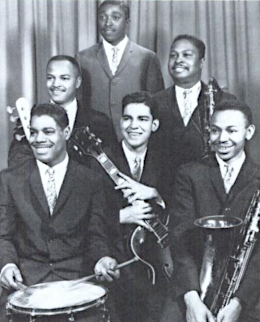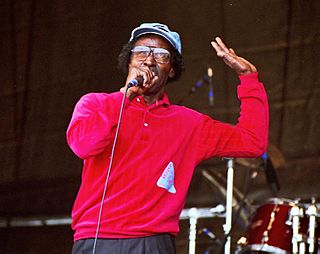
Gladys Knight & the Pips were an American R&B, soul, and funk family music group from Atlanta, Georgia, that remained active on the music charts and performing circuit for over three decades starting from the early 1950s.
Motown is an American record label owned by the Universal Music Group. It was founded by Berry Gordy Jr. as Tamla Records on January 12, 1959, and incorporated as Motown Record Corporation on April 14, 1960. Its name, a portmanteau of motor and town, has become a nickname for Detroit, where the label was originally headquartered.

The Funk Brothers were a group of Detroit-based session musicians who performed the backing to most Motown recordings from 1959 until the company moved to Los Angeles in 1972.

Laten John Adams Jr., was an American blues, jazz and gospel singer, known as "The Tan Canary" for the multi-octave range of his singing voice, his swooping vocal mannerisms and falsetto. His biggest hits were his versions of "Release Me" and "Reconsider Me" in the late 1960s.
John William Bristol was an American musician, most famous as a songwriter and record producer for the Motown label in the late 1960s and early 1970s. He was a native of Morganton, North Carolina, about which he wrote an eponymous song. His composition "Love Me for a Reason" saw global success when covered by The Osmonds including a number 1 in the UK charts in 1974. His most famous solo recording was "Hang On in There Baby" recorded in 1974, which reached the Top Ten in the United States and number 3 in the United Kingdom. Both singles were in the UK top 5 simultaneously.

Edwin Joseph Bocage, known as Eddie Bo, was an American singer and pianist from New Orleans. Schooled in jazz, he was known for his blues, soul and funk recordings, compositions, productions and arrangements. He debuted on Ace Records in 1955 and released more single records than anyone else in New Orleans other than Fats Domino.
Margaret Louise Ebey, known professionally as Margie Singleton, is an American country music singer and songwriter. In the 1960s, she was a popular duet and solo recording artist, working with country stars George Jones and Faron Young. Singleton had her biggest hit with Young called "Keeping Up with the Joneses" in 1964. She managed a successful solo career in the 1960s.

Hi... We're the Miracles is the first album by The Miracles, Motown's first group, released on Motown's Tamla subsidiary label in the summer of 1961. It was the first album released by the Motown Record Corporation. The album features several songs that played an important role in defining The Motown Sound and establishing songwriters Smokey Robinson and Berry Gordy.

Thomas Herman Ridgley was an American R&B singer, pianist, songwriter and bandleader in New Orleans, Louisiana. In a musical career lasting half a century Ridgley was a stalwart of the New Orleans rhythm and blues scene. Although he never had a national hit, unlike several of his contemporaries, he made numerous, popular recordings that sold mainly in New Orleans and Louisiana beginning in 1949 with a final release in 1995. His voice was variously described as similar to Roy Brown and Bull Moose Jackson and thus able to adapt to a variety of styles: blues, jump blues, rhythm and blues and soul. In the late 1950s, he became bandleader of The Untouchables with whom he held residencies at important night venues often backing visiting artists. His recording career consisted of over forty singles and three albums. Most of his recordings have been anthologised on compilations in vinyl and CDs.

Richard Wayne Wylie, often known as Popcorn Wylie, was an American pianist, bandleader, songwriter, occasional singer, and record producer who was influential in the early years of Motown Records and was later known for his work on many records in the Northern soul genre.
Dorothy LaBostrie, later Dorothy LaBostrie Black, was an American songwriter, best known for co-writing Little Richard's 1955 hit "Tutti Frutti".

Ric Records, along with sister label Ron Records, were American record labels formed by Joe Ruffino in 1959. Although most of Ric's releases did not rise above regional hits, the label was active during the golden era of New Orleans R&B and was an incubator for many artists who are now recognized as definers of the style.
Margaret Ann Lewis was an American country music and rockabilly singer-songwriter and music entrepreneur.
Freddie Gorman was an American musician and record producer, most famous as a singer, songwriter for the Motown label in the late 1960s and mid 1970s.
Elizabeth Lands was an American soul singer. Her purported five octave vocal range started her Motown career before Berry Gordy tried to make a name for her in the R&B/Pop market on Gordy Records.
Finley Duncan ran independent record companies in Florida.
Joseph M. Hewell was an American R&B and soul singer better known under his stage name Jo Jo Benson. He was best known for his recordings in the late 1960s with Peggy Scott.
Edgar Vernon Blanchard was an American R&B guitarist, bandleader and arranger who was prominent in the musical life of New Orleans between the 1940s and 1960s.

Danny White was an influential R&B singer and bandleader who worked in the New Orleans area.

Senator Nolan Jones was an American record company owner, producer, singer, and songwriter who worked in R&B and blues. He recorded and promoted Louisiana and Mississippi performers and songs for more than four decades.










